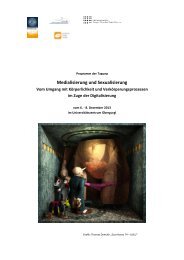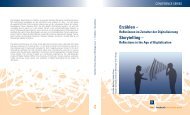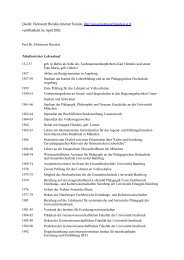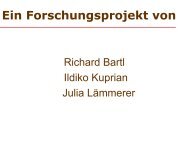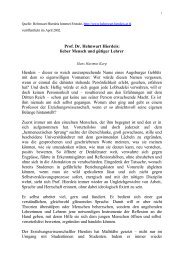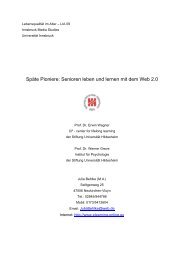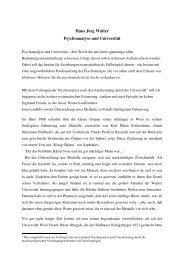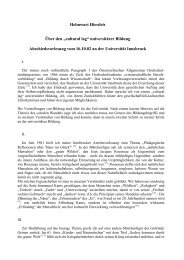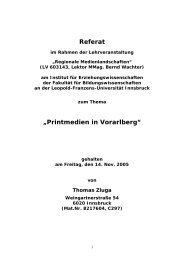Download pdf - Universität Innsbruck
Download pdf - Universität Innsbruck
Download pdf - Universität Innsbruck
Sie wollen auch ein ePaper? Erhöhen Sie die Reichweite Ihrer Titel.
YUMPU macht aus Druck-PDFs automatisch weboptimierte ePaper, die Google liebt.
Sharing and Sustainability Across Institutional and Self-instituted Forms 61<br />
information as a public good, and News International, a for-profit, global corporation)<br />
these questions especially draw attention to issues of integrity and transparency and they<br />
resonate with concerns about the identity of our public institutions. At a time when the<br />
future direction of bastions of the welfare state (including even the British National Health<br />
Service) are under intense scrutiny, institutions face increasing pressure from the market.<br />
Hito Steyerl reflects on this situation,<br />
“Now the problem is – and this is indeed a very widespread attitude – that<br />
when a cultural institution comes under pressure from the market, it tries to<br />
retreat into a position which claims it is the duty of the nation state to fund it<br />
and to keep it alive. The problem with that position is that it is an ultimately<br />
protectionist one, that it ultimately reinforces the construction of national<br />
public spheres and that under this perspective the cultural institution can only<br />
be defended in the framework of a New Left attitude seeking to retreat into<br />
the remnants of a demolished national welfare state and its cultural shells and<br />
to defend them against all intruders” (2006, p. 18).<br />
In the present political climate, geared as it is towards reduction of cultural, educational<br />
and social public goods, how can the focus on permeability, and access from markets,<br />
become an opportunity to advance the ideals of information-sharing and an academic gift<br />
economy? What effect can individuals have in forming sustainable creative networks and<br />
what chances can such networks have for embedding a lasting culture of sharing within<br />
our institutions?<br />
These questions lead us to consider how individuals and their networks are positioned in<br />
relation to academic and cultural institutions. In broad historical terms, ‘institutional critique’<br />
has been in two key phases, in the 1970s and 1990s, with a third contemporary<br />
phase in the 2000s (Raunig & Ray, 2009). More recently, Ned Rossiter has recognized,<br />
“...an urgent need for new institutional forms” (2006, p. 13). Both the accounts of Rossiter<br />
and the Transform project (2005–8) of the European Institute for Progressive Cultural<br />
Policies, inevitably take account of Jacques Derrida’s work, re-thinking the university as<br />
an ideal other, whose subjects are nevertheless inextricably engaged in a with-against<br />
relation to the institution, a relation which suggests at once meeting and leaving the academy<br />
(Morgan Wortham, 2006). In his complex relationship with the university Derrida<br />
sought to both recognize and do away with its existing form. For Derrida, the institution is<br />
inseparably within our experience, of which there is no ‘outside’, “In abstract and general<br />
terms, what remains constant in my thinking … is indeed a critique of institutions, but one<br />
that sets out not from a wild and spontaneous pre- or non-institution, but rather from<br />
counter-institutions. I do not think there is or should be, the ‘non-institutional’” (Derrida in<br />
Morgan Wortham, 2006, p. 13).<br />
This deletion of an ‘outside’, has recently been challenged from an anarchist standpoint,<br />
notably by De Angelis (De Angelis, 2010). A contrasting position is apparent in Alex



